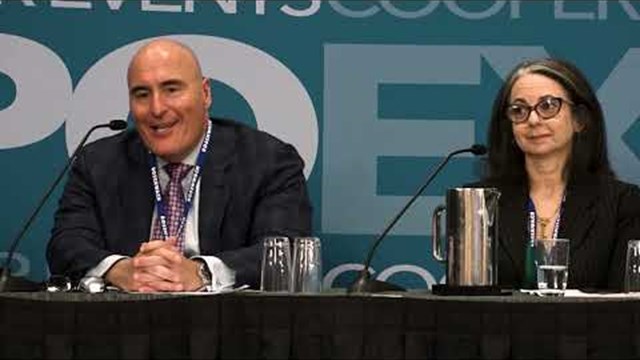
This publication spends a lot of time exploring and explaining the duties and purpose of multifamily boards—the benefits and drawbacks of serving on them, and even the difficulty that many buildings and communities have with motivating owners/shareholders to run for a seat. Less discussed is what happens when there is no board, or if there aren’t enough willing, qualified members of the association or cooperative to step up for the position.
CooperatorNews recently received a question from a reader along these lines. The individual is the current president of her association in an unspecified city. She and her current board colleagues all plan to step down this year, but no one from her 20-unit building submitted their candidacy paperwork when the notice to do so was distributed. The community is self-managed, so should these board members not find replacements willing to take on the role, it would leave no one except an off-site bookkeeper to perform the association’s day-to-day administrative tasks.
We spoke to several attorneys across our markets to understand the ramifications of such a situation—and hopefully to provide a solution framework for this particular reader and others who are faced with a similar predicament.
The Simple Answer
“The simple answer is that there has to be a board of managers to govern the condo,” says attorney Slava Hazin, partner of New York City law firm Warshaw Burstein, LLP. The condo’s bylaws spell out the process and specifics as to number of seats, length of terms, where and when an election shall be held, and so forth. The bylaws also contain provisions for filling board vacancies. Generally, in the event that there aren’t sufficient votes—or candidates—to fill an expired board seat, “the current board remains in place until a new board is duly elected,” according to Hazin.
Given that the board members of the condo in question are looking to move on from their volunteer service, it would behoove them to reach out to their neighbors to motivate them to step up and participate in the governance of their common-interest community. Sheila Van Duyne, owner of the Van Duyne Law Group based in Reno, Nevada, knows a thing or two about this. She focuses her law practice on acting as legal counsel to community associations, and also served on the board of her own. “I certainly understand that running a homeowners association is a lot of work,” she tells CooperatorNews. As a suggestion to our reader who is looking to step down from her board, Van Duyne says, “I think you should send out a notice to the membership telling them that someone really needs to run for the board and help out!”
Not only does an association need to continue to collect assessments, maintain its insurance, and stay in compliance with a broad array of municipal and state regulations, it also needs to make sure that the property continues to be maintained. “Keeping an association functioning is key in maintaining property values and making sure the community infrastructure does not fall into disrepair,” Van Duyne continues. “It is important to everyone that their property values stay high so that they are able to resell their units, obtain financing, and address any problems that arise within the community. As a condominium, the unit owners also all share in many common expenses—a joint roof, joined walls, communal landscaping. If the association ceases to function, then it is possible that homeowners will be facing broken infrastructure, leaking roofs, and failing plumbing—and no one will be able to get these problems fixed, because no one will have been collecting assessments to do so.”
Mark Einhorn, principal at Braintree, Massachusetts, law firm Marcus, Errico, Emmer & Brooks, has a similar response. “It is critical that the existing board members communicate just how serious (and potentially damaging) it is if no one is willing to serve on the board,” he says. “Bills will not be paid, contractors could end up leaving the association or suing for breach of contract, insurance could be jeopardized, etc. All of that means the owners’ investment in their units could be detrimentally impacted. Almost always, in our experience, once owners understand the true impact that not having a functioning board could mean, there usually are volunteers who will step up to serve.”
The Hypothetical Answer
The fact is that a fair number of association and cooperative boards—particularly those that were built or converted in the 20th century—are made up primarily of seniors and retirees. Many of them have been serving on their boards for years, if not decades, and whether they are simply burnt-out or must step down due to age or health or the inevitability of mortality, those vacancies must be filled. However, newer and younger owners and shareholders are by and large less inclined to volunteer for their community’s governance—so it is conceivable that these associations and cooperatives can find themselves in the position of our reader, faced with the prospect of not having sufficient membership to run the building or community. What happens then?
“If the association fails to exist,” says Van Duyne, “then arguably, the State could require the unit owners to retain and pay for outside management services to run their community, if they refuse to take on this responsibility for themselves. This is a serious problem, and it will affect all of the unit owners. It is impossible in this type of situation just to ‘stop being an HOA.’”
Different states may have different processes, and different laws may govern condos, HOAs, and co-ops, but the end result remains the same: a housing association or cooperative must have a board to function. Margery N. Weinstein, Esq., partner at Schwartz Sladkus Reich Greenberg Atlas LLP in New York, says of the situation for co-ops in New York, “If a meeting is held, but there is a failure to elect a sufficient number of directors to conduct the cooperative’s business, under the BCL”—Business Corporation Law, which governs cooperative corporations in the state—“a special meeting for the purpose of electing new board members may be demanded, in writing, by as few as 10% of the shareholders entitled to vote. Most bylaws also have provisions empowering shareholders to call special meetings. If a shareholder wishes to pursue this avenue, it is strongly recommended that he or she consult with an attorney who can advise on the processes and, importantly, on ensuring a fair election at that meeting, free of voter and proxy fraud.”
In New Jersey, says attorney Scott Piekarsky, principal at the Hackensack office of law firm Offit Kurman, P.A., “Under the PREDFDA regulations”—the Planned Real Estate Full Disclosure Act regulations also known as the Radburn Law—“if an association has no executive board members, and the association members fail to act on a petition or by majority, any member or group at common expense and on written notice to all owners may petition a court with jurisdiction for authority to act temporarily in the interest of the association and to organize and hold an election within 90 days of the court’s order.”
In other words, somebody’s gotta step up. Even in the extreme circumstance of judicial intervention, an association must eventually find and elect from among its membership a board of directors to govern and run itself.
The Practical Answer
Attorney Michael C. Kim, of counsel with law firm Schoenberg Finkel Beederman Bell Glazer LLC in Chicago, has seen this situation play out in his client communities. “Particularly in smaller associations,” he says, “there may be a lack of interest among the membership to run for and serve on the board of directors, especially for self-managed associations in which the officers and directors may have to personally perform the various tasks to operate the association.” The double-whammy in these scenarios is that board members can easily burn out. “However,” Kim continues, “the association must have a board (or at least a quorum of the board) in place in order to run the association.”
In the event that a board member’s or members’ term of office is expiring without someone lined up to replace them, “even though their term of office may have technically expired,” says Kim, “they remain as directors until new directors are duly elected and qualified. Of course, a director can always submit his/her resignation and thereby step off the board, but needless to say, if there is no board, it will not take long to have operations come to a standstill, bills be unpaid, utility and other services to stop, sales and refinancings not able to proceed, all leading to a ‘failed’ condominium and chaos.”
To avoid such a disaster, Kim recommends that the existing board members identify other owners/shareholders who seem to be qualified and may be willing to make a commitment to serve for at least a term or two, and then actively lobby them to run. “Consider agreeing to be available as a resource to them so that they are not going to be left to flounder on their own,” he continues. “Possibly it can be done in stages, so that part of the board agrees to stay in place for a year, and then transition off when more new candidates can be convinced to join the board.”
In the worst case scenario, explains Kim, the board or an owner or group of owners will need to petition the Circuit Court to hold an election to fill vacant board seats. If even that fails, then the Court will need to appoint a receiver to take control of and operate the association, Kim explains. “The receiver would be paid for services as well as the receiver’s attorney and possibly a management company—all of which can become very expensive,” he warns.
“It is also possible that the association may be deemed a ‘distressed condominium’ under the Illinois Condominium Property Act, possibly leading ultimately to the termination of the condominium and leaving the owners as tenants in common with no governing structure, likely individual unit mortgage foreclosures, no insurance protection, and loss of equity in their units.” Another possible alternative—but one with similarly disastrous results—is to file for bankruptcy, says Kim, either for reorganization or liquidation. This would put the association or corporation in the hands of a bankruptcy trustee. Either way, “it would be worse than a third world country,” Kim contends.
“If there is truly no one to serve, you should check your condominium documents and see if there is any process stated for approving budgets and/or filling board positions,” adds Einhorn. “As a very last resort, it may be possible to seek a court appointment for a receiver to manage the property—but that really would be a terrible shame, because of the costs involved, and, with effort and communication, typically that can be avoided.” In avoidance of such an outcome, Kim suggests that the board members “engage a qualified attorney to candidly address the situation at a meeting of the owners—hopefully there will be a positive response.”
To borrow from Benjamin Franklin’s remarks at our nation’s Constitutional Convention: it is an HOA (or co-op or condo)—if you can keep it.
Darcey Gerstein is Associate Editor and a Staff Writer for CooperatorNews.






3 Comments
Leave a Comment